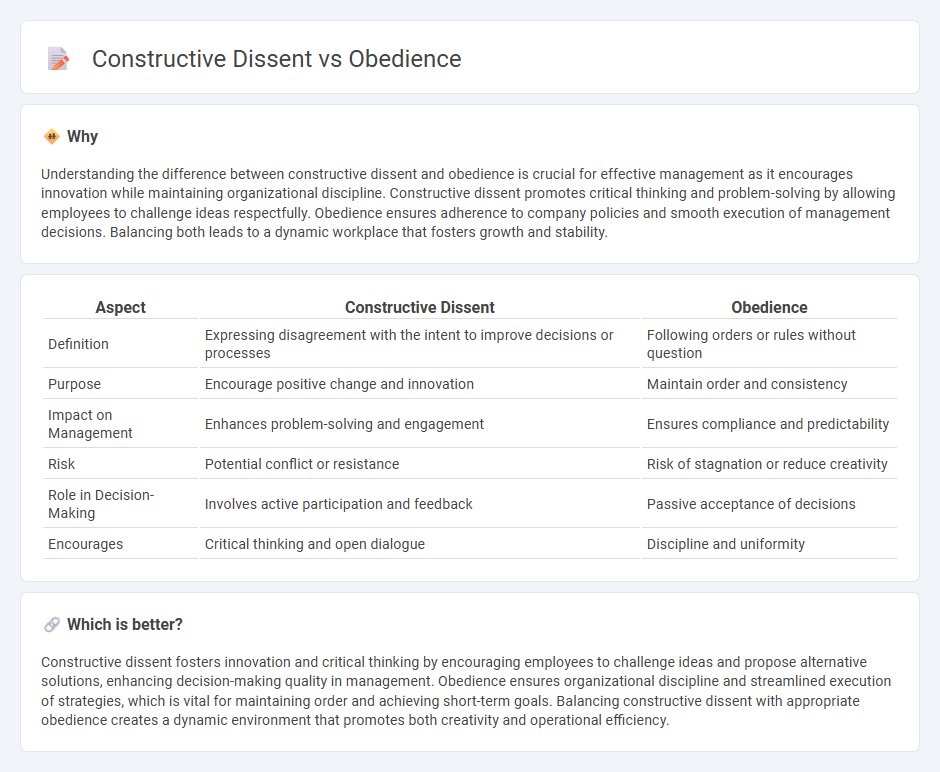
Constructive dissent fosters innovation and critical thinking by encouraging employees to challenge ideas and propose alternatives within an organization. Obedience ensures adherence to established rules and maintains order, which is essential for operational consistency and efficiency. Explore how balancing these approaches can enhance leadership effectiveness and organizational success.
Why it is important
Understanding the difference between constructive dissent and obedience is crucial for effective management as it encourages innovation while maintaining organizational discipline. Constructive dissent promotes critical thinking and problem-solving by allowing employees to challenge ideas respectfully. Obedience ensures adherence to company policies and smooth execution of management decisions. Balancing both leads to a dynamic workplace that fosters growth and stability.
Comparison Table
| Aspect | Constructive Dissent | Obedience |
|---|---|---|
| Definition | Expressing disagreement with the intent to improve decisions or processes | Following orders or rules without question |
| Purpose | Encourage positive change and innovation | Maintain order and consistency |
| Impact on Management | Enhances problem-solving and engagement | Ensures compliance and predictability |
| Risk | Potential conflict or resistance | Risk of stagnation or reduce creativity |
| Role in Decision-Making | Involves active participation and feedback | Passive acceptance of decisions |
| Encourages | Critical thinking and open dialogue | Discipline and uniformity |
Which is better?
Constructive dissent fosters innovation and critical thinking by encouraging employees to challenge ideas and propose alternative solutions, enhancing decision-making quality in management. Obedience ensures organizational discipline and streamlined execution of strategies, which is vital for maintaining order and achieving short-term goals. Balancing constructive dissent with appropriate obedience creates a dynamic environment that promotes both creativity and operational efficiency.
Connection
Constructive dissent and obedience are connected through their roles in effective management by balancing innovation and organizational stability. Constructive dissent encourages employees to challenge ideas and improve processes, while obedience ensures alignment with organizational goals and policies. Together, they foster a dynamic environment where critical feedback is respected without compromising order and discipline.
Key Terms
Authority
Authority plays a central role in balancing obedience and constructive dissent, as it establishes the framework for governance and decision-making within organizations and societies. Obedience to authority ensures order and compliance, while constructive dissent promotes critical thinking and innovation by challenging unjust or ineffective directives. Explore deeper insights into how authority shapes the dynamics between obedience and dissent to foster healthy organizational culture.
Voice
Voice in organizational behavior balances obedience and constructive dissent by enabling employees to express concerns and suggestions without fear of reprisal. Constructive dissent promotes innovation and problem-solving by challenging the status quo, while obedience ensures alignment with established policies and procedures. Explore how fostering a culture of open voice can drive both compliance and creative input effectively.
Psychological Safety
Psychological safety influences the balance between obedience and constructive dissent by fostering an environment where employees feel secure to voice concerns without fear of retribution. High psychological safety promotes open communication, encouraging innovation and critical feedback essential for organizational growth. Explore further to understand how cultivating psychological safety can transform team dynamics and decision-making processes.
Source and External Links
Obedience - New Advent - Discusses obedience as a virtue or principle of righteous conduct, emphasizing its role in fulfilling superior's orders with intent to honor authority.
What Is Obedience? - Renewal Ministries - Defines obedience as a heartfelt commitment to God's love, contrasting it with mere outward conformity or technical compliance.
Obedience - Wikipedia - Explains obedience as a form of social influence where individuals yield to explicit instructions from authority figures, highlighting its distinction from compliance and conformity.
 dowidth.com
dowidth.com